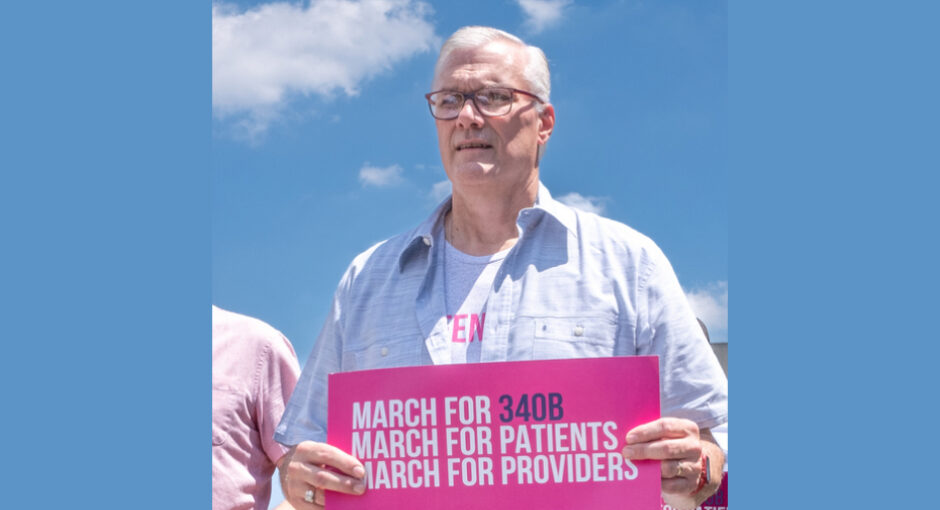With a two-year implementation delay nearly over, New York State is poised to fold its Medicaid managed care prescription drug benefits into its Medicaid fee for service system on April 1. State 340B health care providers that serve high volumes of Medicaid beneficiaries say they still hope to stop the transfer, which they say would be catastrophic for them and their patients.
Under Medicaid FFS, providers must bill at acquisition cost for 340B-acquired drugs. Under Medicaid managed care, they can bill plans for 340B drugs at negotiated rates above their purchase costs. Providers say these margins pay for essential services to vulnerable New Yorkers.
“Fiscal Cliff Come April 1”
“The [340B] covered entity community is facing a fiscal cliff come April 1,” said Mark Malahosky, vice president of pharmacy services at Trillium Health, a federally qualified health center serving Rochester, N.Y. “It’s not hyperbole to say if this is put into place, we’re going to have to cut services and cut staffing. It’s a huge hit to us overnight.”
Mike Lee, chief operating officer of Evergreen Health Services, said his Buffalo, N.Y., FQHC could lose $14 million in revenue annually that would go toward patient care.
“This isn’t just the food pantry going away or patient transportation going away,” Lee said. “It’s behavioral health, it’s primary care. It impacts everything.” He said Evergreen hired four mental health counselors, a nurse practitioner, and a registered nurse in the wake of the May 2002 mass shooting at a Topps Supermarket in Buffalo’s predominantly Black East Side. The Medicaid drug benefit transfer jeopardizes those investments in patient care, he said.
“It’s jobs and patient care,” Lee said. “You can’t just take away $14 million. You’re talking about many, many jobs.”
New York lawmakers passed a bill in early 2020 to consolidate Medicaid drug benefits under FFS effective April 1, 2021. Health centers, HIV/AIDS clinics, and other providers lobbied hard against the move, warning that it would take at least $240 million in 340B-related revenue away from safety net providers, leading to service cutbacks and site closures. In early 2021, state lawmakers pushed back the transition date to April 1, 2023.
The state says the switch will give it better visibility into drug costs, provide a single drug formulary, give it more negotiating power, and “address the growth of the 340B program and associated reductions in state rebate revenue,” according to a state health department FAQ about the transition.
The state’s independent pharmacies support the transition. They say under the current system, independent pharmacies often are excluded from managed care provider networks or forced to accept contracts for at-cost or below-cost reimbursement to be included.
“While we are aware of pressures to delay or repeal the Medicaid pharmacy benefit shift … we believe that New York must move forward without delay,” the Community Pharmacy Association of New York State says.
State Notifying Beneficiaries Shortly
Statewide and regional coalitions of health care and community groups have been pressing Gov. Kathy Hochul (D) to cancel the pharmacy benefit transfer and urging her and lawmakers to consider an alternative solution. The state is forging ahead, however. According to a Jan. 17 update to stakeholders, Medicaid managed care plans will start mailing notices about the change to beneficiaries on Jan. 30.
The state health department did not respond to a request for comment about the benefit transfer. It told a Buffalo television station for a Dec. 14 news story about the transfer, “The transition is expected to result in a more efficient pharmacy reimbursement process, better consumer experience and higher rebates from drug manufacturers. The 340B program is a federal program that is not being eliminated. The Department of Health is working with the impacted groups and is committed to ensuring a smooth transition.”
Malahosky said, “We continue to have fruitful discussions with all stakeholders, including those at the state, on a workable alternative solution that addresses their concerns, gives the state what is says it is seeking from the move to fee-for-service, and protects the 340B safety net.”
“We are confident that we have a path to a solution that will not decimate covered entities across the state come April 1,” he continued. “We remain hopeful that this plan can either be implemented by April 1, or if not, that we secure a delay to allow the state time to implement.
“I see this as an exportable solution to other states that may be considering a similar move to fee-for-service,” Malahosky said.
Other State Activity
Virginia is one of those states. A bill was introduced Jan. 11 in the state House “to consolidate state agency prescription drug purchasing and consolidate pharmacy benefit management to increase efficiency and constrain spending on prescription drugs.” It includes transitioning all Medicaid pharmacy services “to fee-for-service benefits to improve program efficiency and cost savings by applying best practices from other states that have transitioned.”
California implemented a Medicaid pharmacy benefit transfer in January 2022 similar to New York’s scheduled transfer. A group of California health centers sued the state and the U.S. Centers for Medicare & Medicaid Services in federal district court in Sacramento to reverse the change.
The California Primary Care Association sought permission Tuesday to file a friend-of-the-court brief in the case. The brief says the transfer of Medi-Cal managed care pharmacy benefits to Medi-Cal fee for service “is harming patient services,” and that “there is yet no effective backstop to shore up the loss in 340B savings,” which it says could be as high as $205 million annually.


